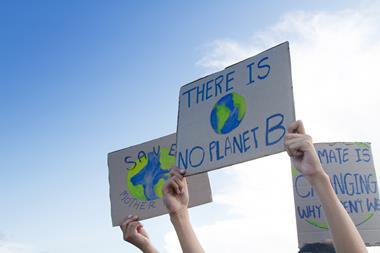Corporates and governments will increasingly be held to account for climate-related human rights failings
In its market predictions for the year ahead, law firm Clyde & Co says that more industries will come under the spotlight as climate litigation grows and that more climate-related human rights cases will be brought in 2023.
While the oil majors were the first to be hit by climate litigation, a growing number of emission intensive industries will face similar challenges in 2023, it predicts.
Those already facing increasing attention include automotive companies, particularly in the US and Germany, cement manufacturers and increasingly architects, engineers and others in the construction industry.
”The building and construction industry accounts for 40% of global carbon emissions and litigants are looking to the industry to improve its processes and make buildings more sustainable,” says Clyde & Co’s Emma Ager. “Other targets appear to include the plastics industry and the food industry.”
Corporates face an increasing number of damages claims
As discussion of the climate emergency escalates, communities are becoming increasingly frustrated by the perceived lack of action from governments and large corporations.
To expedite climate policy changes, NGOs are attempting to hold national governments to account for alleged violations of human rights, with growing implications for corporates.
Another important case is proceeding in Europe. In Agostinho v. Portugal, six Portuguese youths have started proceedings against all state signatories to the European Convention on Human Rights, alleging that climate change is a violation of Articles 2 (right to life), 8 (right to integrity of family home) and 14 (right to non-discrimination).
The Council of Europe Commission of Human Rights has published preliminary findings indicating a likely finding of breach. The claimants do not seek financial compensation, but damages awards are likely to become the objective of future cases.
“If a breach is established there may be several consequences,” says Clyde & Co partner Neil Beresford. “The first is that governments will have to take immediate action to tighten climate policy to bring the Paris agreement and international obligations into national law.
“Second, we may begin to see damages claims being commenced against governments.
“Third, similar tactics may be used to claim against large corporations, as happened in the Milieudefensie v Shell case in The Netherlands.”
“A decision on the Agostinho case is expected early next year and could lead to a significant increase in rights violation cases directly against states and indirectly involving large corporations,” he concludes.




















No comments yet